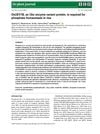Efficient Editing of CSLD2 Orthologue by CRISPR/Cas9 Affects Cell Morphogenesis of Root Hair in Spinach
January 2022
in “
Research Square (Research Square)
”
CRISPR/Cas9 cellulose synthase-like D CSLD Spo23361 Spo10340 root hair formation transgenic hairy root lines homozygous bi-allelic heterozygous chimeric Arabidopsis csld2 mutants cell wall modulation membrane trafficking Agrobacterium rhizogenes CRISPR root hair transgenic roots Arabidopsis mutants cell wall membrane

TLDR CRISPR/Cas9 editing in spinach affects root hair growth by altering specific genes.
The study successfully used CRISPR/Cas9 to edit two cellulose synthase-like D (CSLD) genes, Spo23361 and Spo10340, in spinach, which are involved in root hair formation. Four types of mutations were observed, with deletions being the most common (64.1%). From 15 transgenic hairy root lines, seven homozygous/bi-allelic and eight heterozygous/chimeric mutated lines of Spo23361 were obtained, with the former showing bulking and short root hairs similar to Arabidopsis csld2 mutants. For Spo10340, 13 heterozygous/chimeric lines were obtained, all displaying normal root hair phenotypes. Transcriptomic analysis indicated that gene expressions related to cell wall modulation and membrane trafficking were disrupted in Spo23361 mutants, inhibiting root hair growth. The results demonstrate that Agrobacterium rhizogenes-mediated CRISPR/Cas9 is an effective tool for genome editing in spinach, paving the way for future large-scale applications.



